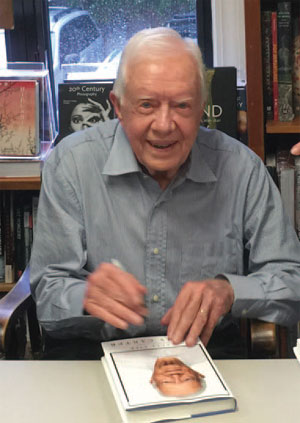At 90, Jimmy Carter reflects on his rich life, and China doings
|
Jimmy Carter signs his book A Full Life: Refl ections at Ninety on July 9 at a bookstore in Washington. Chen Weihua / Chian Daily |
The sudden downpour in Washington last Thursday evening caught more than 100 people standing in line outside the popular bookstore Politics & Prose, soaking them as even umbrellas were rendered somewhat useless. Those arriving early and queuing up inside were lucky.
But no one in the horrendous rain backed off as they waited for the 39th US President Jimmy Carter to sign copies of his new book: A Full Life: Reflections at Ninety.
Carter, who turns 91 on October 1, has been a prolific writer, authoring some two dozen books. The latest spends much space on the time he grew up in rural Georgia and his experience with the racial situation of those days.
As the second-oldest living former US president - younger than George H. W. Bush by about four months - Carter has been a witness to most of the 20th century and now part of the 21st.
His new book is not focused on his experience with China, but China is touched on in multiple places. As a young boy, Carter admired the Baptist missionaries who served in China and pledged a nickel a week to help build hospitals and schools for Chinese children.
Carter recorded his first trip to China in early 1949 on a US submarine, with port calls in Hong Kong, Shanghai and Qingdao.
That was toward the end of China's civil war, and Carter was then not sympathetic to the army led by Mao Zedong, but rather Chiang Kai-shek's KMT army. The fact that Chiang's wife, Soong Mei-ling, was a graduate of Wesleyan College in Georgia may have played a role in this.
Carter expressed his admiration for the Flying Tigers led by General Claire Chennault, who fought alongside the Chinese against Japanese invaders.
Although Carter admitted that the China diplomatic issue was rarely discussed during his campaign, he was increasingly convinced that the US should acknowledge an obvious fact: the People's Republic of China was the government that should officially represent the Chinese people. And he decided to exercise the authority given to the president if the issue of Taiwan could be settled.
So after becoming president in 1977, he put the normalization of diplomatic relations with the People's Republic of China on his key agenda, along with peace in the Middle East, an end to apartheid in South Africa, and opening communications with Cuba.
"One of the most compelling facets of my life has been my relationship with China," Carter wrote.
In describing Deng Xiaoping's landmark trip to the US in 1979, Carter wrote that "his charisma, frankness, and quick wit went a long way toward overcoming the widespread aversion to the 'Red Chinese Communists' on the mainland."
"Measured by long-term global impact, this was probably the most important diplomatic decision I ever made," Carter wrote.
As someone who created the Department of Energy and installed solar panels on the White House roof in 1979, Carter has been an advocate for renewable energy. He was amused to find during a later visit that some of the panels were on exhibit in China, which now produces 18 percent of its electricity from renewable sources, compared with 10 percent in the US.
"We're in an inevitable relative decline in role influence. Not because of any fault of ours, but it's, as I said, inevitable. I think that the combination of China and India and Brazil and South Africa and others as an increase in economic and cultural influence will replace a lot of the power and preeminence that the United States has enjoyed in the past," he said.
"So we're having - whether we like it or not - to accommodate that necessity of realizing other people are going to be as powerful and as influential as we are in some aspects of life, not militarily. We'll stay preeminent there for a long time. But I think economically, China will soon, you know, succeed the United States as the number one economic power in the world."
Contact the writer at chenweihua@chinadailyusa.com.





















